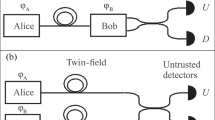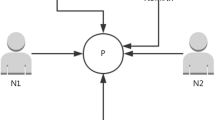Abstract
We come up with a special attack strategy to the quantum key distribution protocol based on quantum encryption. With our strategy an eavesdropper can elicit about half of the key bits without being detected by the legal communication parties. Furthermore, the eavesdropping needs only facilities similar to that of the legal parties. Therefore, we draw a conclusion that the original protocol is insecure and, at last, a feasible improvement of the protocol is proposed.
Access this chapter
Tax calculation will be finalised at checkout
Purchases are for personal use only
Preview
Unable to display preview. Download preview PDF.
Similar content being viewed by others
References
Zhang, Y.-S., Li, C.-F., Guo, G.-C.: Phys. Rev. A 64, 024302 (2001)
Nielsen, M.A., Chuang, I.L.: Quantum computation and quantum information. Cambridge University Press, Cambridge (2000)
Karimipour, V., Bahraminasab, A., Bagherinezhad, S.: Phys. Rev. A 65, 052331 (2002)
Bagherinezhad, S., Karimipour, V.: Phys. Rev. A 67, 044302 (2003)
Bennett, C.H., Brassard, G.: Proceedings of the IEEE International Conference on Computers, Systems, and Signal Processing, Bangalore, India, p. 175. IEEE, New York (1984)
Author information
Authors and Affiliations
Editor information
Editors and Affiliations
Rights and permissions
Copyright information
© 2005 Springer-Verlag Berlin Heidelberg
About this paper
Cite this paper
Gao, F., Qin, SJ., Wen, QY., Zhu, FC. (2005). An Effective Attack on the Quantum Key Distribution Protocol Based on Quantum Encryption. In: Feng, D., Lin, D., Yung, M. (eds) Information Security and Cryptology. CISC 2005. Lecture Notes in Computer Science, vol 3822. Springer, Berlin, Heidelberg. https://doi.org/10.1007/11599548_26
Download citation
DOI: https://doi.org/10.1007/11599548_26
Publisher Name: Springer, Berlin, Heidelberg
Print ISBN: 978-3-540-30855-3
Online ISBN: 978-3-540-32424-9
eBook Packages: Computer ScienceComputer Science (R0)





